
“If [a fight] breaks out, I’ll go for that one with the red scarf.” With these words, the Public Force’s regional director of Puntarenas, Randall Picado, expressed his intention to deal with a group of organized groups that protested at the Government Council session in celebration of the 199th anniversary of the Annexation of the Party of Nicoya to Costa Rica.
The protesters were part of the contingent that were present in Recaredo Briceño Park along with student federations from the National University (UNA) and the University of Costa Rica (UCR), the Nicoya Feminist Collective and the National Disability Movement. Several of them wore a scarf.
When he was asked again about what he said, Picado changed his position. “If the fight breaks out here, we contain it here. Nobody passes here,” he said and insisted: “That no one passes here. Here absolutely no one passes, neither the one with the red scarf nor the other one.”
The Voice of Guanacaste requested an explanation about the police operation that day and about the actions of the officer shown in the video, but the Ministry of Security’s press officer indicated that the minister could not address questions at this time.
The officer said it almost at the end of the session, when President Rodrigo Chaves was still giving his speech in front of the public and both his supporters and opposition protesters were shouting towards the stage and even exchanging words amongst themselves.
“There they are, and those are the ones, those who sell the nation,” the group of detractors shouted while cornets played. “Go to Nicaragua, communists,” “what you want are more thieves,” those who supported Chaves, closer to the pavilion’s stage, responded to the group.
Complaints mingled with President Rodrigo Chaves’ strong voice alternating with shouts into the microphone. “I’m not going to let up, no matter how much the rector’s henchmen shout, I’m not going to let up.”
“I come to Guanacaste and I recharge with courage, will and bravery to move forward because it’s not for me, it’s for our children, for the Ticos who decided to be that of our own free will,” he concluded.
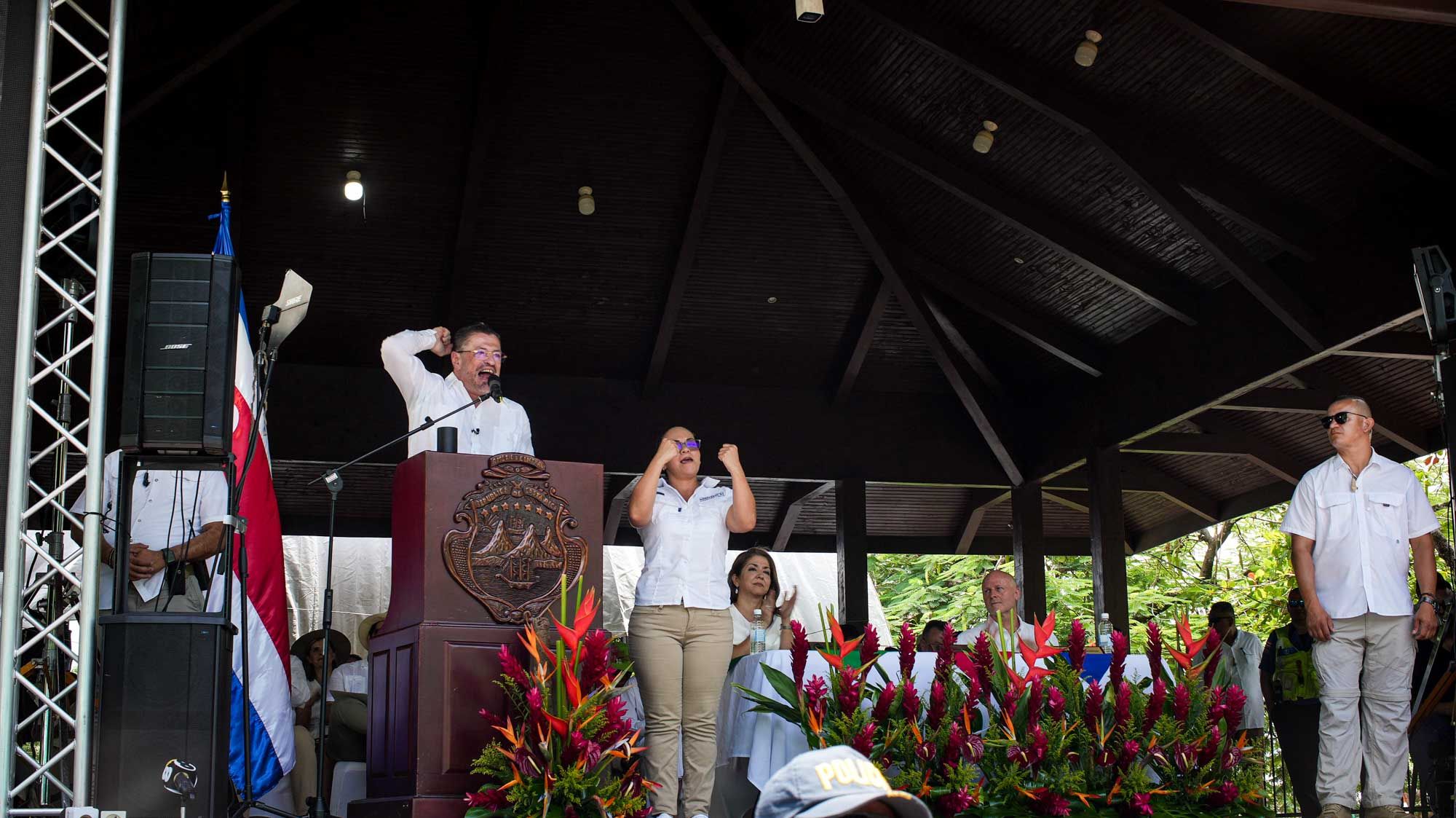
In his speech, Chaves reiterated that Guanacaste is the province that has the most intentions to build, according to data from the College of Engineers and Architects. “Those are masons, those are construction laborers, engineers, they are the ladies who sell lunches,” he emphasized.Photo: Rubén F. Román
Government Operation Restricted Protests
Earlier, for an hour, some 20 policemen prohibited entry and detained the group of 15 protesters from the student federations and other groups, located two blocks from the park, trying to protest at the session.
“We want to raise awareness that as a province, we are still owed,” Valeria Briceño, one of the protesters, told presidential adviser Charlene Sánchez, who was directing orders to the police. The official asked them to put away the megaphones that the group had brought with them in order to give them access to the park.
“All the people who have come to demonstrate are first addressed to see how they can be helped and channel the petitions through the institutions,” the official told the group of collectives.
Minister of Communication Jorge Rodríguez reaffirmed what Sanchez was telling the group. “The person in charge of the territorial liaison was addressing the students to find out the reason for the protest and provide them with an answer with the competent leader,” he told The Voice.
After the negotiation between the presidential official and the young people, the police surrounded the group both during their entry and during their time in the park, creating a barrier between the group and the other people present at the event, who mostly applauded the words of the president and his cabinet.
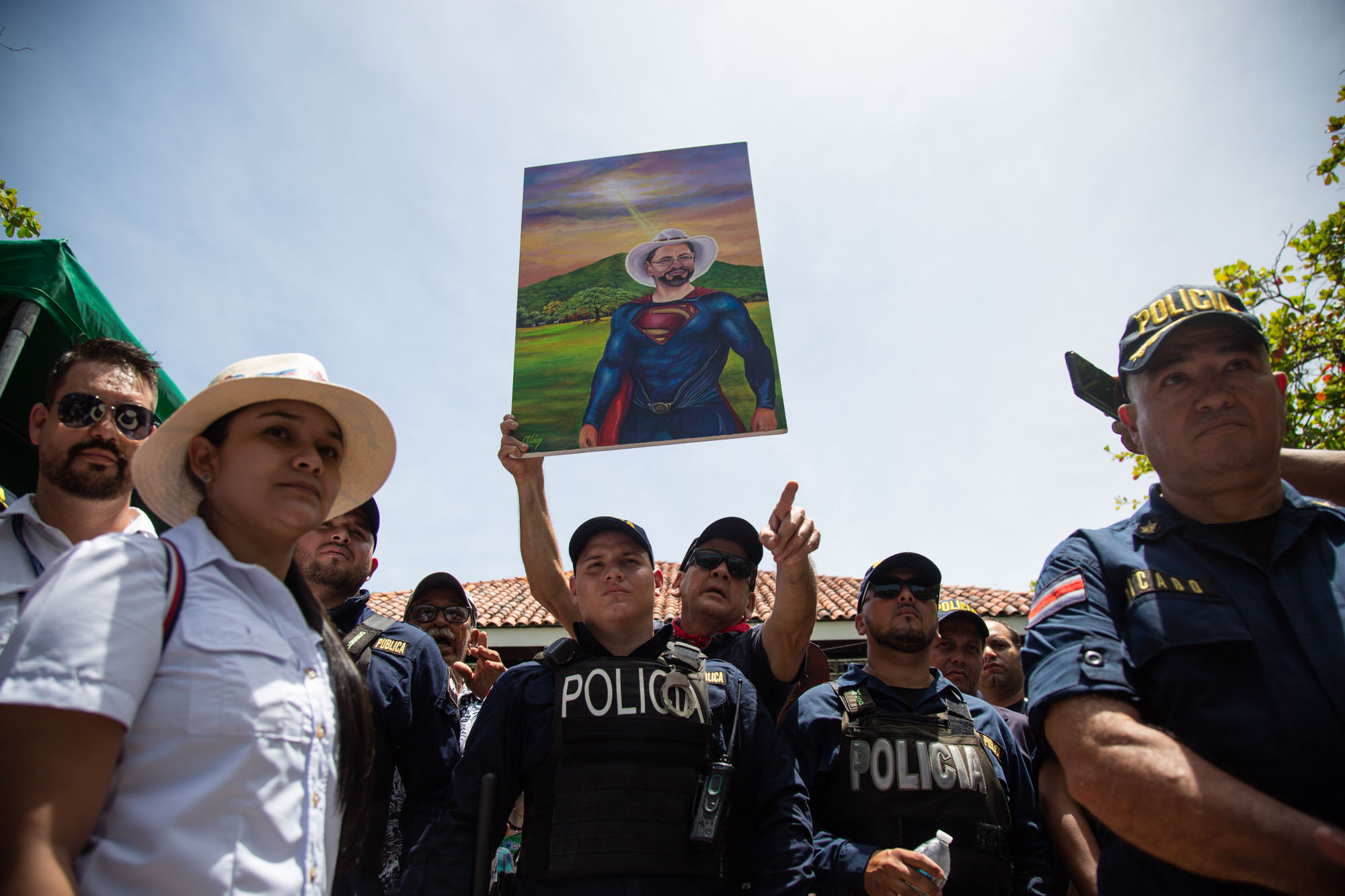
Randall Picado, regional director of Puntarenas, who suggested “going for the one with the red scarf,” is the first one on the right in the photo. He and dozens of others created a barrier between the group of protesters and the other people present at the event, who mostly applauded the words of the president and his cabinet.Photo: César Arroyo Castro
Three other judicial officials who managed to get close affirmed that they were searched, asked for personal information and their protest signs were reviewed.
“We came peacefully and calmly, pleading to be heard due to the appeals that we have before the [Constitutional] Courtroom, but 100 meters from the park, there is a filter where the only thing they didn’t ask me for was the death certificate,” said Jesús Leal, one of the three protesters. “They searched us, asked what were the protest signs, what did they mean and they are very evident; they are about our pensions, nothing more.”
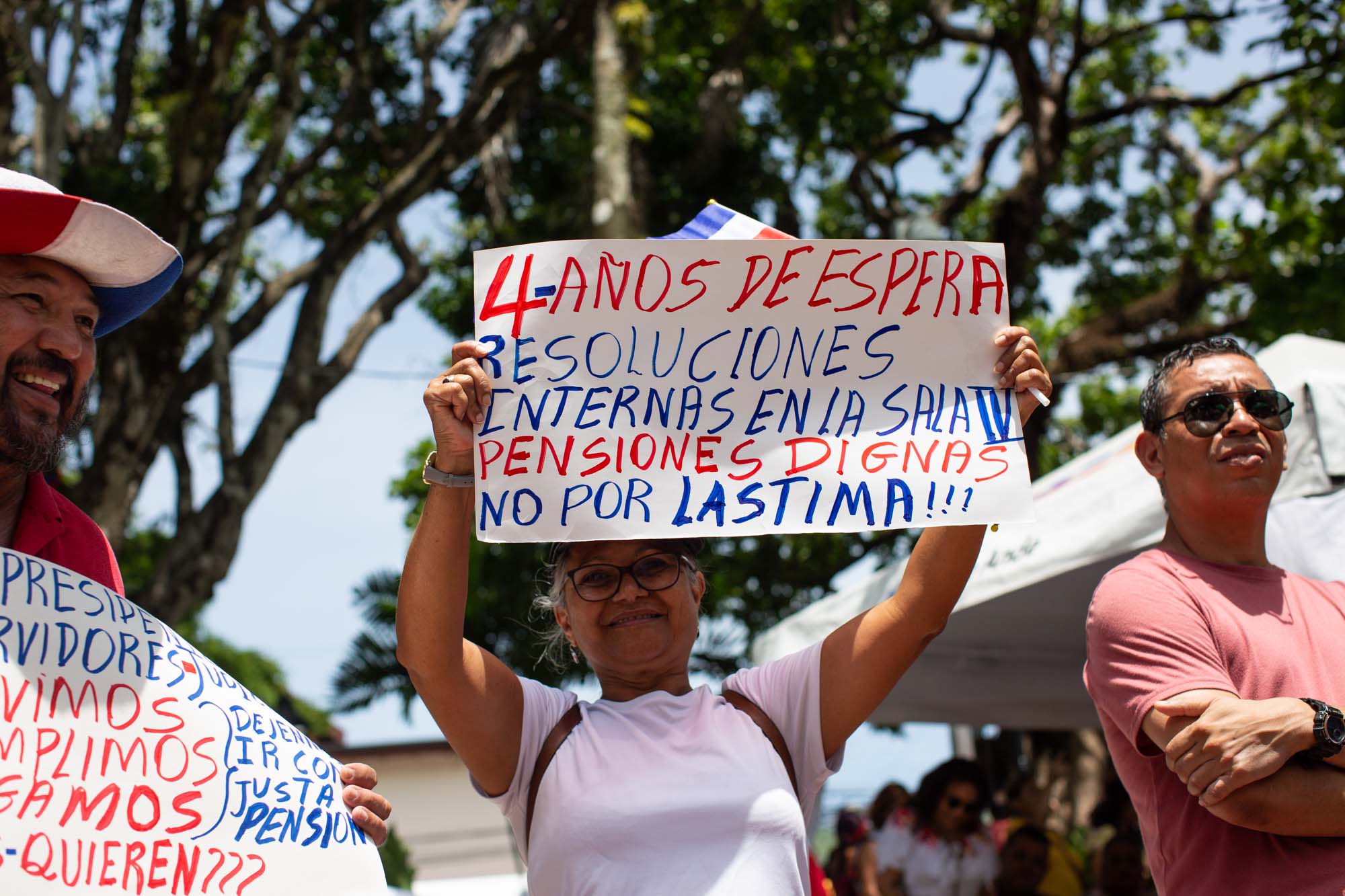
The vast majority of the public who attended supported President Chaves and his government with applause and shouts of support. But the protesting groups also included the Association for Saving and Developing the Nicoya Peninsula and its Islands and a small group of judicial officials.Photo: César Arroyo Castro
“In the second filter, eight police officers stopped and four escorted us so that we wouldn’t move from there, until Diario Extra and PUSC legislator Melina Ajoy arrived, and through her, they gave us a little freedom,” added Leal, who pointed out that nothing similar had ever happened to them despite having demonstrated in places such as the Constitutional Courtroom and the Supreme Court of Justice.
The Complaints
The few groups criticizing Chaves positioned themselves behind the supporters, who arrived early on to get spots under the shade and take photos with legislator Pilar Cisneros, from the same political party as the president.
One of the groups sought the government’s support for the idea that the peninsular territories of Paquera, Lepanto, Cóbano and the islands should return to the jurisdiction of Guanacaste, and not of Puntarenas.
The student group came with requests on educational issues. “There are many, many elementary and high schools with health orders that are not being handled, students who are ending up without scholarships, for example from the Avancemos (Let’s Keep Going) program, transportation and student cafeteria issues,” said Augusto Guerrero, from UNA.
A discussion continues between the government and the public universities over the allocation of the Special Fund for Higher Education (Spanish acronym: FEES) budget, which, constitutionally, should increase by 1% per year. The government doesn’t intend to do so with what is pending from 2022 and only plans to do so for next year’s budget.
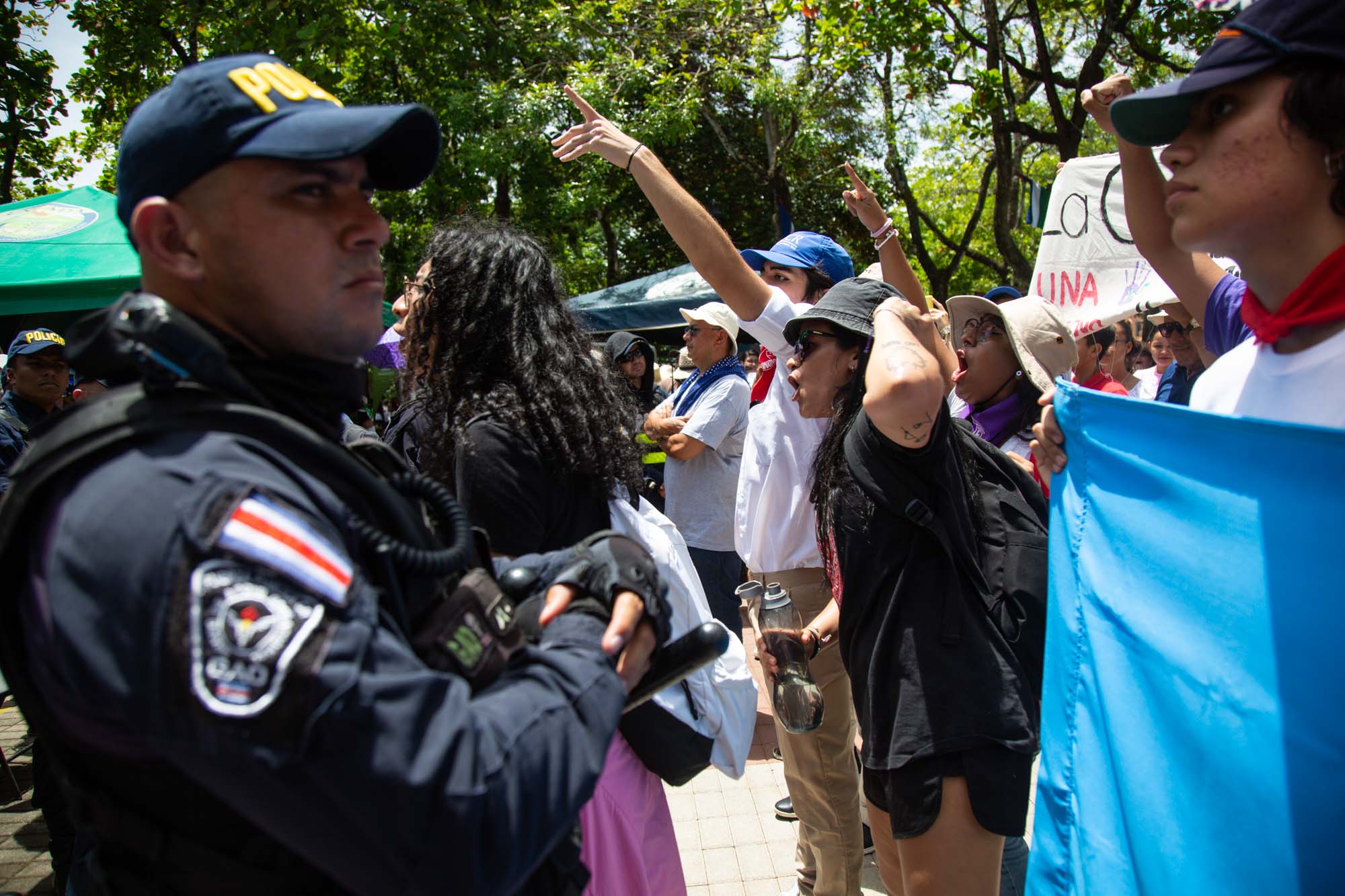
“There they are, and those are the ones, those who sell the nation,” chanted student and feminist groups while President Rodrigo Chaves gave his speech during the Government Council in Nicoya’s Recadero Briceño Park.Photo: César Arroyo Castro
No Protest Signs, Please
Officials from the Presidential House walked among the public asking those who did manage to get close to lower their protest signs. This was witnessed by The Voice and also detailed by the Association for Saving and Developing the Nicoya Peninsula and Its Islands.
They even did so with other people who held banners in support of the government and who were accompanied by Jennifer Arnáez, head of the office of legislator Daniel Vargas, from the same political party as the president and former Liberationist candidate for mayor of Nicoya.
“They came to us to tell us that they had already taken photos of us, that they had already taken our emails, that we should get away from where we were standing,” said Liliana Díaz, a member of the group demanding the return of the peninsular territories to Guanacaste.
“As president and government, I appreciate and value him, but I don’t like being discriminated against,” added Veracruz Chavarría.


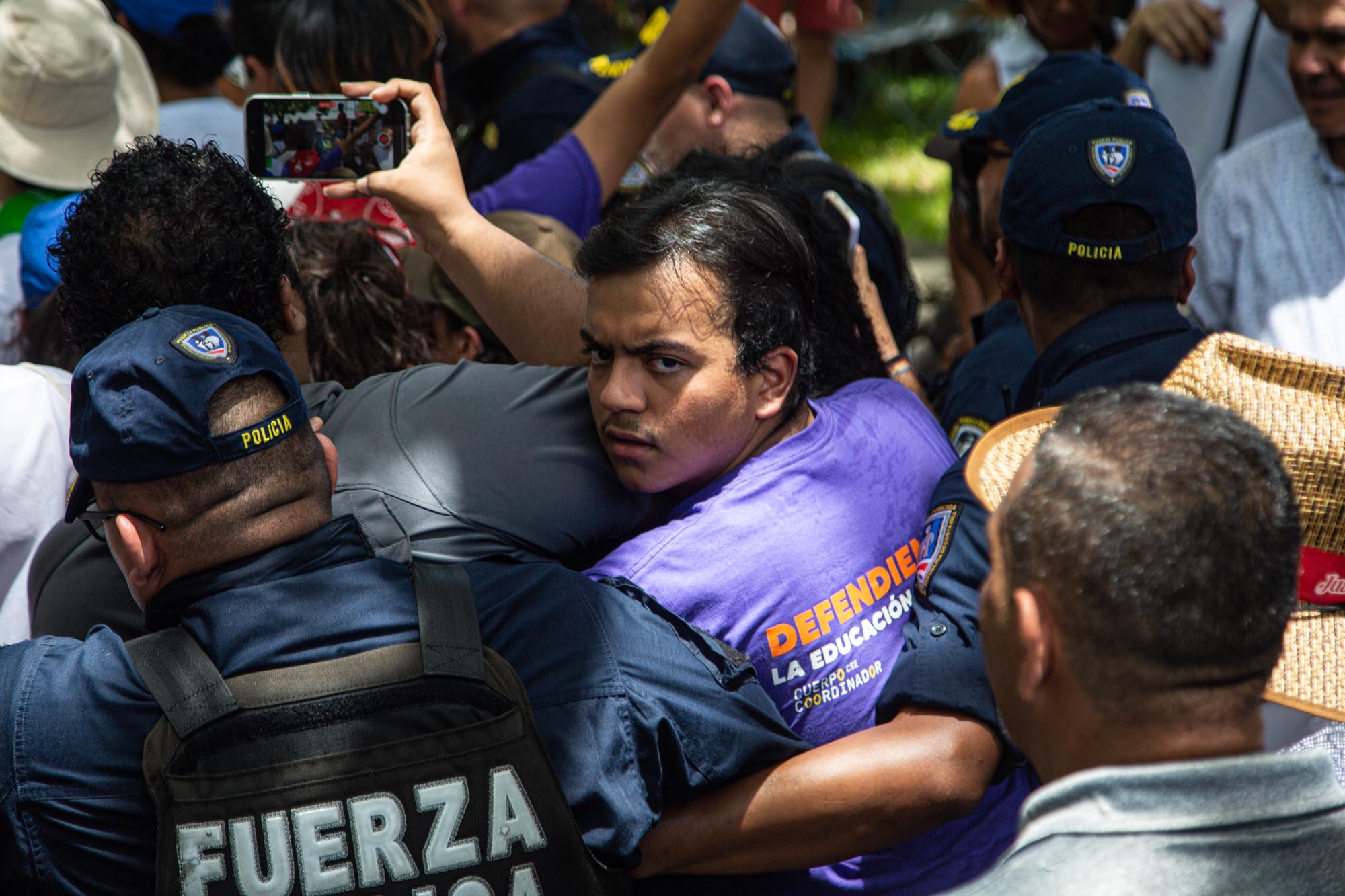
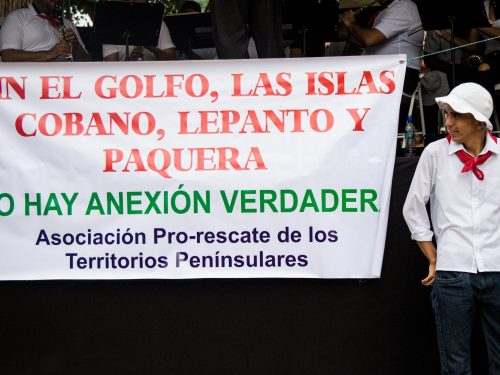
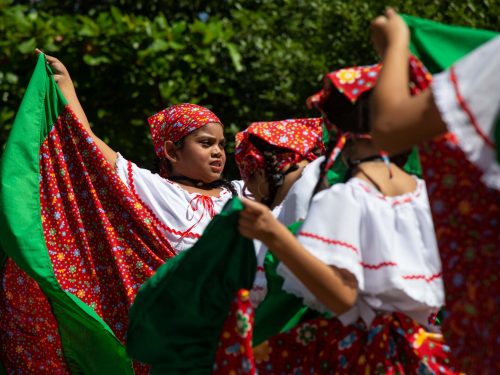
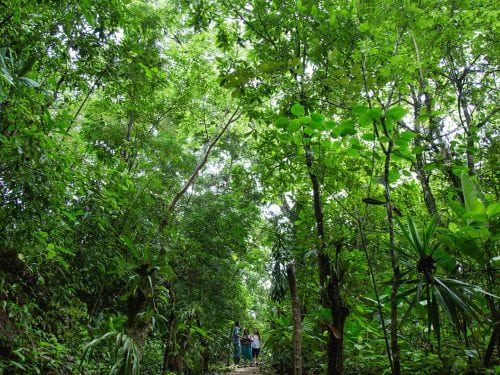

Comments